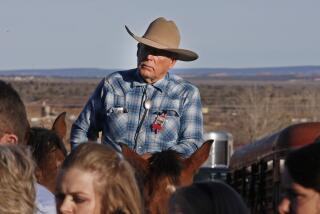‘Freemen’ Ready to End Standoff With FBI, Gritz Says
JORDAN, Mont. — Former Army Col. James “Bo” Gritz, looking exhausted Monday as he drove through a howling rain after a third day of talks, said that the “freemen” locked in a five-week-old standoff with the FBI here are ready to surrender--if their leaders are given safe passage to present their case to the Montana Legislature.
It was the second settlement offer in two days--and seemingly no more promising than the earlier demand for the federal government’s approval of the group’s anti-government credos--but Gritz said he has received assurances that two state government representatives would meet with the 20 holdouts today.
Gritz said he also expected to finalize plans for the release of two girls locked in the compound with their mother, and for a freeman sympathizer wanted in an unrelated South Carolina case.
“This could be the log that releases the jam,” Gritz told reporters after a four-hour meeting at the 960-acre ranch. “They want safe passage to Helena [the state capital], and I think the FBI’s going to grant them that. All they want is a forum where they can make their case.”
Gritz said the freemen leaders want the public to hear their argument that the nation’s fundamental legal system has been corrupted. “They’ll present their case, and if they’re rejected by those men that are the law, then this is something that will result in their submission to what is the law,” Gritz said.
*
Federal authorities continued to refuse to allow former anti-government militant Randy Weaver to enter the freemen compound. In an interview Monday, he said local FBI officials have been stymied in their attempts to resolve the conflict by a hard-line stance in Washington, D.C.
“The local feds here say they’re all for it, but then Washington says no. Pride and ego are standing in the way. They figure if I go in there and talk ‘em out, I’ll get the credit. It’s pride, it’s childish and it’s scary, actually,” Weaver said.
It was Gritz, accompanied by retired Phoenix Police Officer Jack McLamb, who ended the 1992 standoff between Weaver and FBI agents in Ruby Ridge, Idaho, in which Weaver’s wife and teenage son and a federal marshal were killed. The 57-year-old Gritz has a loyal following among right-wing militants and has opened his own survivalist compound, called Almost Heaven, near Kamiah, Idaho.
Gritz taped a segment of his weekly radio talk show at the Veterans of Foreign Wars hall in Jordan on Monday, then drove out to the ranch with McLamb.
On Sunday, Gritz emerged from the compound with a 26-page document challenging the constitutionality of the FBI, the Internal Revenue Service and other federal agencies. The freemen have pledged to walk out if the government can disprove the legality of their claims, but Gritz said Monday he had received no response to the document from the U.S. attorney in Billings.
Garfield County Atty. Nick Murnion, who has spent years battling the freemen over their so-called common law courts, refusal to pay taxes and challenges to state and federal government agencies, said there was nothing new in the freemen’s legal claims.
“They’re trying to support their contention that they can declare their independence from all of the laws. The question, as Mr. Gritz put it, is what proof would suffice? They, of course, believe there’s a conspiracy that involves all of the media, all of the attorneys, all of the judges and all of the government. So who is it that could speak to this at all, other than Mr. Gritz?” Murnion said.
Still, he added, Gritz’s involvement represents the most positive development in the standoff, which began when the FBI moved in to arrest freeman leaders Leroy Schweitzer and Donald E. Peterson on March 25.
“There’s some hope,” Murnion said. “I think he [Gritz] is of the right political persuasion, and certainly probably has more credibility with these folks than a lot of potential negotiators. So he does seem to offer them the possibility to come out in a more dignified manner.”
Gritz appeared overcome with emotion and close to tears Monday as he described his talks with Edwin Clark, son of ranch owner Ralph Clark, whom he called “a genuine salt-of-the-earth type” who had been taken over by “parasites” and forced into the standoff. Like others in Jordan, Gritz has sought to draw a distinction between the old Jordan farmers like the Clarks and militant freemen who moved into the Jordan ranch when the law was closing in on them elsewhere.
Weaver spent most of the day waiting, miles away in Jordan, lunching on hash browns with gravy at the local cafe.
“It’s just been a bad dream every day, and all of this is bringing it back,” Weaver said, recalling how his wife was killed by an FBI sharpshooter as she stood at the door of their Ruby Ridge cabin, holding their baby.
His 14-year-old son had been killed earlier in the standoff, and a friend lay shot and bleeding in the cabin during much of the confrontation.
“It was just sheer terrorism, a couple family members killed, and sitting up there in a cabin eight or nine days after your wife and son are dead and wondering if you’re going to be the next dead meat,” Weaver said. “These guys [the freemen], let me tell you, there’s a zillion things going through their head. A zillion things, believe me.
“They’re just looking for some hope, and some help. They’re grasping at straws right now.”
More to Read
Sign up for Essential California
The most important California stories and recommendations in your inbox every morning.
You may occasionally receive promotional content from the Los Angeles Times.










